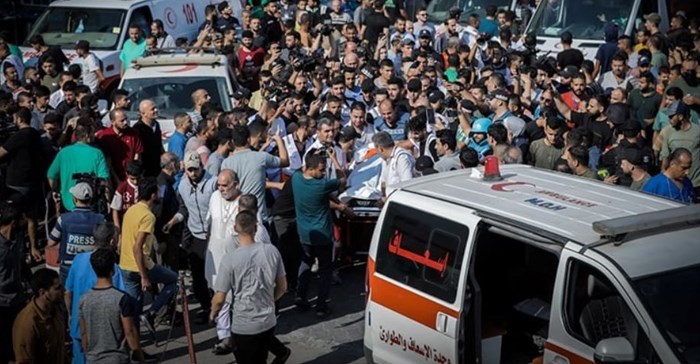As of Thursday, 19 October, International SOS has confirmed that approximately 1 million people in Palestine territories have been displaced.

Source: WHO. Time is running out to prevent a humanitarian catastrophe if fuel and life-saving health and humanitarian supplies cannot be urgently delivered to the Gaza Strip amidst the complete blockade.
This as conflict has surged to new heights following the recent explosion of a bomb within the confines of a hospital car park in Gaza City.
The repercussions of this medical humanitarian crisis have reverberated far beyond the immediate locale. In Northern Gaza four hospitals have been completely evacuated and are no longer operational, and a further 20 hospitals in the north of Gaza are facing evacuation orders from the Israeli military.
Those hospitals that remain operational are experiencing significant challenges including overcrowding, disruption of power, fuel shortages and risks of further strikes.
International SOS is a global medical and travel security services company that specialises in providing assistance and support to organisations and individuals facing health and security challenges while travelling or working abroad.
Ryan Copeland, the firm's regional medical director, EMEA, confirmed that evacuation of critical patients from these hospitals may not be feasible or realistic given the risk exposure of further strikes on these medical facilities.
"Emergency response services within these territories are extremely stretched and overwhelmed due to the severity of the strikes and due to the extensive damage to the surrounding infrastructure, creating a dangerous operating environment."
He noted, the remainder of hospitals across Gaza and the West Bank remain operational but with very reduced capacity as Gaza is impacted in particular by power disruptions, shortages of generator fuel, medical-supply shortages and an increased influx of casualties and transferred patients."
Humanitarian crisis and urgent needs
Copeland said that along with the disruption of power, there has been a collapse of water and sanitation services.
Initial assessments of stocks of essential food and commodities within the Gaza Strip show that there is around two weeks' worth of food remaining and about four to five days of stock left in shops.
"We have read through various media reports that food and essential goods, and health and humanitarian supplies from UN agencies and partners have arrived in Egypt. They are waiting for safe transport into Gaza and into the West Bank," Copeland said.
Concerns about dehydration and waterborne diseases remain high at this time.
It is also estimated that hundreds of people are still trapped beneath rubble.
"Decomposition of bodies and the collapsed buildings also increases the humanitarian and environmental concern," Copeland said.
Israel's healthcare adjustments
Meanwhile, Israel's Ministry of Health has been transferring patients from hospitals in the north to hospitals in the centre of the country. This activity has been undertaken in order to enable preparations and preparedness of hospitals in the north for any future developments that may occur.
"The Health Ministry has needed to put in place healthcare provisions to account for the needs of the internally displaced within Israel. And this includes smaller Israeli communities around Gaza, but also larger populations evacuated from Sderot with a population of around 34,000 and Ashkelon with a population of around 50,000. The provisions that have been needed to be put in place include the ability to provide prescription medications and primary care requirements, as well as increased resourcing for resilience centres and for emotional support."
The current state of play is that Israel's healthcare system remains fully operational with access to emergency care in both the public and selective private hospitals.
"We are aware that there are specific hospitals that have been designated as the main referral centres for major trauma cases, and these have now been set up with dedicated emergency room- and operating theatre access."
Impact on emergency care
"What we've also seen is due to the limitation of overall movement within the country, there's been a decrease in routine emergency-care cases which has provided some short term relief on the emergency rooms accounting for increased casualties.
"There are no reports of shortages of medical consumables or blood products.This is only expected to change if there's a sudden escalation of hostilities, and we see a sustained closure of airspace.
"From the medical assistance capability within Israel, we're still able to provide medical advice and referrals."
Regional tensions and security monitoring
Benedikt Zimmermann, International SOS security manager, said the organisation has seen a continuation of low-intensity fighting between Israeli forces and Hezbollah forces in the north.
"We continue to monitor sporadic rocket fire from the Gaza Strip to Israel. This is mostly affecting the southern regions, but also central regions
including Tel Aviv and the outlying cities in that metropolitan area.
"Based on this risk, we continue to advise to defer all travel into areas directly bordering the Gaza Strip, because those areas clearly see the highest volume and highest amount of rocket fire and the highest risks associated with that.
"We've seen some incidents of anti-tank guided missiles fired at Israeli tanks and some retaliatory fire toward and into southern Lebanon. There have been some casualties including some fatalities on both sides, but this has remained on a low intensity and at a lower level.
"So far we've also seen a continuation of airstrikes targeting Gaza, mostly focused on the northern end of the Gaza Strip.
"We are continuing to monitor the situation regarding the anticipated ground offensive, which has not started yet, but it seems that preparations and the build-up of forces around the area are continuing."















































